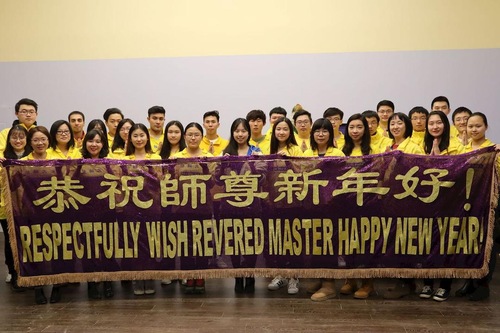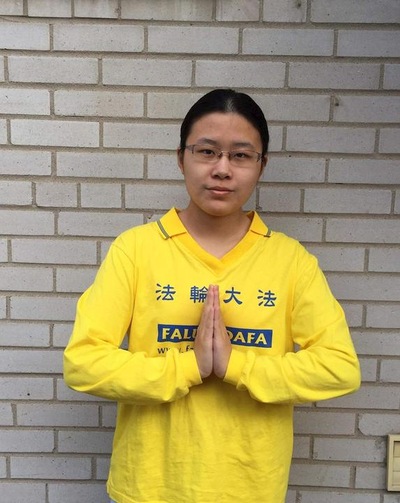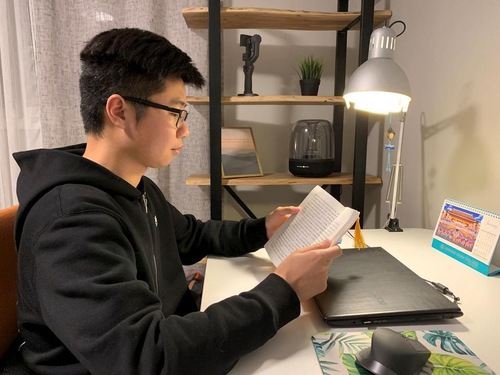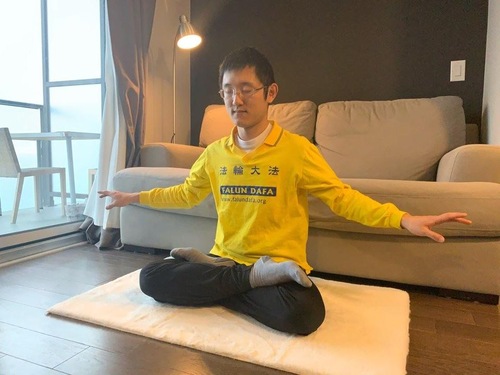(Minghui.org) The Practitioner Youth Club in Toronto recently held a whole-day event to read together and share understandings. They hope to do better and remain diligent in cultivation practice in 2020. They also expressed gratitude for the guidance from Falun Dafa and wished the founder, Mr. Li Hongzhi, a happy New Year.
The club, whose members meet weekly, was launched in April 2017, and consists of middle schoolers aged 13 and up, college students, and young professionals. They all practice Falun Gong. Some started in their childhoods because their parents practiced, some began to practice after leaving China, and some had misunderstandings initially due to the defamatory propaganda from the Chinese Communist Party (CCP), but later learned the truth about the practice. There are also some who watched a Shen Yun performance and became interested in the practice.
 Members of the Practitioner Youth Club in Toronto send New Year's greetings to Master Li.
Members of the Practitioner Youth Club in Toronto send New Year's greetings to Master Li.
Below are some of their stories.
Doing the Exercises in the Morning as a Routine
 Undergraduate practitioner Rina
Undergraduate practitioner Rina
Rina is an undergraduate student who started to practice Falun Gong with her mother in 2016. She talked about how she overcame her attachment to comfort and started to do the exercises in the morning as part of her daily routine.
During her first two years of college, Rina had a schedule similar to that of her peers. She would stay up late and would not get up early, unless she had classes in the morning. She found her productivity low and she did not have enough time to review her class notes or do her homework, let alone study the Fa or do the exercises.
She wanted to change, but did not know how. As she was talking to her mother one day, she learned that many practitioners wake up early in the morning for the exercises, and some sleep only three or four hours per day. She was touched, and planned to try to do the same after she finished college. But another practitioner recommended that she start sooner, and relayed Master’s words:
“...always cultivating as if you were just starting will surely result in achieving your ultimate rank.” (“Fa Teaching at the 2009 Greater New York International Fa Conference” Collected Fa Teachings, Vol. IX)
“So I made up my mind to change,” Rina recalled. She had previously planned to do the exercises in the evening, but that often did not happen because she was busy with classwork, or her roommate was around, or she simply felt lazy. “So I decided to go to sleep half an hour earlier so I could do the morning exercises. By the time I woke up, though, it was already time for class. The following day, I slept an hour earlier and set three alarms. But again I found myself too sleepy and exhausted to wake up—as if I had stayed up the entire night. I was very frustrated and did not know why,” she said.
A week passed and the same practitioner asked her about the morning exercises. Rina told her what had happened. The practitioner suggested that Rina study the Fa more and send forth righteous thoughts. The two of them also read “Dafa Disciples Must Study the Fa” (Collected Fa Teachings, Vol. XI).
Rina sent forth strong righteous thoughts. “When it was time to get up in the morning again, I negated all the random thoughts—unhappiness, discomfort, and worrying about being sleepy during class. I instead told myself that doing the exercises was something very enjoyable and refreshing,” she explained.
In addition to going to bed early, she also kept studying the Fa, memorizing the Fa, and studying with other practitioners online. “This way I was able to join the exercises in the morning and do all five sets of exercises for the day. I am now more energetic than ever and hope more practitioners can try this,” she added.
No Resentment
Jackie, a graduate student, used to live with a practitioner. After watching Shen Yun and becoming interested in Falun Dafa, he began to practice in 2013. He shared some experiences he had in graduate school.
In the beginning, Jackie did not like the environment at school and thought he did not belong there. “I then figured that there could be some reason I was here. One day while studying the Fa, I realized that being a graduate student here is just the superficial reason. The reality is that I need to cultivate in this environment and help people learn about Falun Dafa,” he explained. Therefore, when he worked as a teaching assistant he sometimes shared his understandings of Truthfulness-Compassion-Forbearance with the students. This helped the students become more engaged with the coursework.
During his first year, Jackie did many experiments as part of his research, but most were failures. This frustrated him and upset his professor, who expected results. Seeing no results after one year, the professor became tough on him and criticized him in front of other people. Recognizing this as an opportunity to improve his mind nature, Jackie could take it in the beginning. But after this was repeated a few times, Jackie felt wronged and thought he should not be scolded, since he had done his best. He started to develop negative thoughts and resentment toward his professor.
“Nonetheless, I tried to suppress such thoughts,” Jackie said, “Then the professor assigned someone else to do my project. When that person could not get it to work out, instead of giving him a hard time, the professor simply said, ‘All right then. No need to waste time on this.’ I felt unbalanced. Things like this happened a few times and the resentful feeling was overwhelming, and was coupled with jealousy. I tried to change that but was unsuccessful,” Jackie said.
One day, a practitioner talked about the cultivation stories of Milarepa and said he was impressed by what Milarepa experienced. Jackie began to read the stories on Minghui and was very touched. For instance, Milarepa’s master instructed him to build a stone house, dissemble it, and build it again. This went on a few times, during which his master also beat Milarepa and hurled bad words at him. “But Milarepa did not have negative thoughts and he just attributed that to his karma. This reminded me that my professor's attitude toward me—along with switching my projects—is somewhat like that. Since Milarepa did not complain, I should not have negative thoughts either. I should just work on it, tempering my heart, and new projects might come,” he said.
The following week, the professor gave him another project and asked him to give it a try. There were some minor detours, but Jackie was able to generate decent results after some time. As he reported this during the group meeting, his professor praised him, “This is pretty good. Other people have not done that in the past.” Jackie thanked him, and in his mind he was grateful to Master for the opportunity and enlightenment.
Letting Go of Selfishness
Vickie, who works in a large financial firm, started to practice Falun Gong with her family members in her childhood. After the suppression started in 1999, she witnessed her mother’s arrest, and stopped practicing. She did not continue until she graduated from a college overseas and found a job in 2017.
In her sharing, she talked about a recent article on Minghui with the title “I Enlightened to the Importance of Letting Go of Ego and Being Cooperative.”
“This reminded me how to negate ego and cultivate that aspect. In the meantime, I have realized that many attachments are associated with selfishness, which functions as a root that generates many attachments. The process of letting go of selfishness is a journey of returning our true selves with compassion,” she said.
Vickie then explained what she meant with an example that occurred during the Shen Yun promotion last November. As she arrived at a booth, a practitioner was already there and they chatted for a while.
“She told me that when she worked with me on something for the first time, she was annoyed by me since I said something that practitioners do not say. She was very angry, but did not say it. In her mind she decided not to ask me to help with Shen Yun promotion again,” Vickie said.
These words shocked Vickie, because she had no idea how bad the situation had been. Plus, no one had criticized her like this for a long time. “At that moment, I felt very bad and had to hold back my tears,” Vickie said. “At the same time, I was very ashamed about myself. I decided to place myself in the lowest position and accept the criticism unconditionally.”
A third practitioner during that shift was an hour late. “Although the third practitioner kept apologizing, I knew it was not accidental, since without that, I would not have heard the feedback earlier. If there is barrier between practitioners, it could exist as bad substances in other dimensions, blocking people from being saved,” Vickie added.
During that shift, Vickie had received an email saying that the office building she worked in had approved a booth to sell Shen Yun tickets. “I had been waiting for that email for one week already and it came right at this moment. I know it was Master encouraging me,” she said.
Vickie said that positioning herself below others makes her feel good. “Without selfishness, you won’t be jealous of others. When you are truly considerate of others, you will have a pure heart for saving others. You may also be enlightened to more wisdom from the Fa,” she said.
Driving on the Road
 Robert, a college student in his junior year
Robert, a college student in his junior year
College junior Robert began reading Dafa books with his mother when he was very young. But he did not consider himself a genuine practitioner until late 2017. He spoke about letting go of attachments and improving xinxing, and he gave an example of when he was driving.
Robert has been driving in Toronto for about two years, and occasionally encounters drivers who are impolite. Most of the time, he dismisses those situations, and thinks of himself as a Dafa practitioner who adheres to a high standard. But once during a traffic jam, he was forced to stop his car abruptly several times because of another car. Many bad thoughts came into his mind, and he tried to suppress them. “When thinking about this later that day, I knew I had done very poorly. Plus, although I knew I did not have a peaceful mind, I did not think further about why this would happen to me repeatedly,” he added.
Through continued Fa-study, Robert realized that letting go of attachments was not that easy. “With help from Master, this attachment was exposed. But I did not face it and directly work on it. Instead, I was looking outward and complaining about others. If you really think about it, nothing during the cultivation journey is accidental and these incidents happened for me to eliminate my human notions and improve,” Robert said. He has since been able to do better.
From this experience, Robert also came to understand that reading the Fa is different from really studying the Fa wholeheartedly. The former is like a following a routine, while the latter is actually disciplining oneself according the Fa principles. “Especially for us young practitioners. When we encounter something, how our heart moves is the key,” he said.
Category: Improving Oneself






